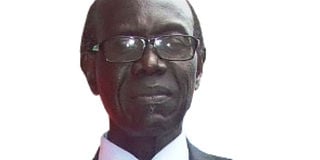On the rise and fall of Algeria’s Bouteflika

President Abdelaziz Bouteflika of Algeria is a classic case study of an African leader whose deeds vindicate an answer given to the question, “what is Africa’s problem” posed by a pseudo revolutionary and self-styled freedom fighter in 1986 at an Organisation of African Unity summit in Addis Ababa.
The answer the revolutionary gave was that Africa’s problem was leaders who overstay in power.
Bouteflika’s self-inflicted tragedy is sadly not an isolated case. There are many African leaders who are fellow travellers on a treacherous road, which invariably ends in disgrace and the dustbin of history.
Bouteflika has been in the news lately because of serious unrest which has rocked Algeria since he announced in February that he would seek election as president for a fifth term. Bouteflika, who ascended to power in 1999, has ruled Algeria for 20 years. He was at a Swiss hospital for two weeks and returned last Sunday.
On March 11, Bouteflika succumbed to people power and announced that he would no longer seek election for a fifth term. Spontaneous, boisterous and widespread celebrations greeted the announcement.
Since 2013, when he suffered a stroke, Bouteflika has rarely been seen in public. He has, in fact, not spoken publicly to Algerians for seven years which has led some of his opponents cynically call him “the invisible president”.
Legacy
Bouteflika was born in 1937 in Morocco. In 1956, he joined the National Liberation Army, which waged a bitter and protracted liberation war against French colonialism in Algeria. The war forced France to grant independence to Algeria on July 4, 1962.
Bouteflika rose rapidly through the ranks of the army and won the trust of army commander, Col Houari Boumedienne, who seized power in 1965 and deposed Ben Bella, the charismatic president of Algeria.
Ben Bella was a highly respected, progressive and pan-Africanist leader like Nkrumah, Lumumba, Nyerere, Obote and Kaunda. The silver lining on the dark cloud was that Boumedienne effectively implemented Ben Bella’s progressive foreign policy vis-a-vis Africa and the Non-aligned Movement.
I first met Bouteflika in 1974 at the United Nations headquarters, New York. He was foreign minister of Algeria and one the finest from Africa. He was elected president of the historic 29th Regular Session of the UN General Assembly (UNGA).
One of the significant actions taken by the 29th UNGA, under Bouteflika’s dynamic and wise leadership, was to expel apartheid South Africa from the General Assembly. I was a witness of that momentous event along with my colleague, ambassador William Naggaga. The plenary hall erupted in jubilation when UN chief of protocol Ali Teymour was directed by the UNGA president to escort the South African delegation, which included ambassador Pik Botha, out of the plenary hall, to the chagrin of USA and Western European countries.
Several attempts had been made to expel South Africa, but failed due to manipulations by South Africa’s Western friends who invoked a dubious procedure called “the Hambro formula”. On that auspicious day, Bouteflika beat them in their own game and inflicted a severe blow against racism, racial discrimination and apartheid.
In 1975, the 6th Special Session of the UNGA convened to discuss problems of “raw materials and development” and the session, chaired by Bouteflika, adopted a landmark “Declaration and Programme of Action on the New International Economic Order”. Efforts to establish a new international economic order based on equity, justice and sovereign equality of states dominated negotiations at the UN during the 1970s and 1980s.
As foreign minister, Bouteflika left a remarkable, proud and enviable legacy which could be erased or swept under the carpet because of his unprincipled attempt to cling to power against the will of Algerian people. The same thing is happening in the Sudan where the writing is on the wall for Omar Bashir whose days are numbered. There are also many mediocre and unpatriotic African leaders sailing in the same leaking boat with Bashir and Bouteflika.
The just struggle of wananchi for freedom, justice and equality for all Africans is unstoppable. I wish the gallant people of Algeria decisive victory in their struggle for liberty.
Mr Acemah is a political scientist and retired career diplomat.
[email protected]




